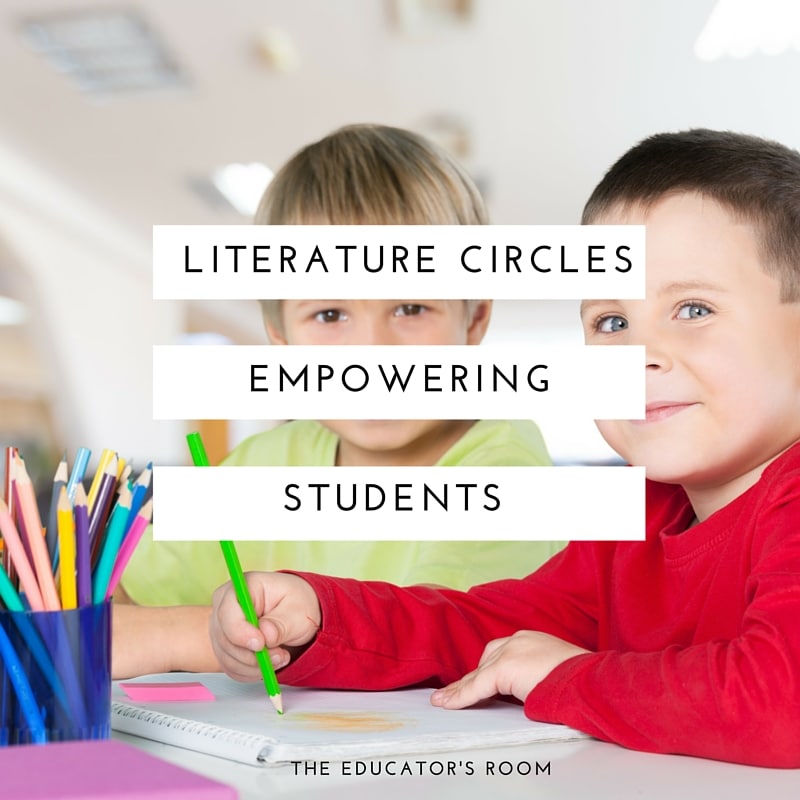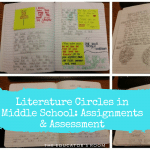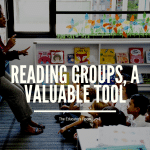Ideally, by the fourth quarter, I want to be unnecessary in my classroom; I hope that my students are so self-sufficient that I can partner with them instead of lead and coach. To me, this idea is the mark of true learning; the control baton has passed from me to them. I need three-quarters to prepare them, and sometimes plans don’t quite pan out. For the last five years, I have used Literature Circles as my primary method to empower students.
What are Literature Circles?
In Literature Circles, a small group of students comes together to read, discuss, and analyze a piece of literature. Each small group works with a different story. Literature Circles can meet to discuss a single work or they can meet throughout the year to discuss different works.
Why Literature Circles?
Literature Circles encourage the students to enter in a more personal conversation than a full class discussion allows. As I walk around the room, I listen to students talk about how their relationships reflect the main character’s relationships; they compare conflicts; they give advice to each other. It’s a genuine interaction. By the end of the novel, they freely criticize the author’s style, and sometimes, their opinions ignite arguments. My notoriously silent students find their voices. The non-reader type students join the conversation because they can’t hide behind a crowd. Needless to say, Circle Meeting Days equal higher engagement.
Choice leads to Differentiation of Instruction. After five years, I have never had a student tell me that he wasn’t interested in any of the books on the list. More often than not, students tell me they can’t decide because they want to read most of the books. Besides book selection, the teacher has the power to differentiate assignments. As best as possible, I create an individual assessment that encourages students to personally connect to the book: Ted Talks, Critical Reviews, Chapter Re-Writes, Conversations with a Character, etc…By the end of the year, I want the students to showcase their analytical talents.
How do I start?
Book Selection: I start by choosing a unifying idea (usually thematic), but a common thread isn’t a requirement. For example, my sophomores are reading coming of age stories (Fault in Our Stars, Boot Camp, Divergent), my juniors are reading Social Issue stories (The Program, Hate List), and my American Lit Honors students are reading Dysfunctional America Pieces (Nineteen Minutes, The Help). Next, I scour the library, book closet, and bookstores for multiple copies of books. Fortunately, my school has a book club, so we have several sets of books. At times, I have to be creative to find three to five copies; I have borrowed from teachers, I have talked to local libraries, and I have lent students my personal copies. Now, after consulting my students, I select books for the next year and fill out a budget request. Currently at my school, the entire Sophomore Literature Classes (approximately 150 students) and half of the junior class (approximately 140 students) are working in Literature Circles. It required creativity, preparation, and compromise, but we found books for every student.
Group Selection: When I introduce Literature Circles, I show them reflection comments from the previous years: sometimes your best bud isn’t the best group mate. Typically, I give a book talk (briefly describe each book). Then, I ask the students to rank their top three books, write the name of one person they want to work with, and write the name of someone they don’t want to work with. I don’t ask questions about their group member choices. From there, I attempt to partner students with one of their top three books; it is more important to me that they read a book they are interested in than they work with a friend. Out of five years, I have only failed to do this for two students. Rarely do a place a student with someone he doesn’t want to work with (if that’s the case, I always converse with the student before announcing groups). This year, I allowed my honors students to form their own groups with one direction: they couldn’t be in the same group with someone they had been placed with for the last two projects. By setting this boundary, the students were forced to step outside of their friend comfort-zone. Surprisingly, selection went smoothly; class leaders orchestrated compromises, and I didn’t have to step in. Other teachers create a draft system, and some teachers select groups randomly.
Assignment Selection: The key is to have a group assignment and an individual assignment. Then, the students are accountable not just to themselves, but the grade isn’t solely dependent on group work (so the teacher can assess the individual student). Usually, I assign a role to each student for Meeting Days (Director: writes quality discussion questions, Summarizer: writes a recap of the section, Quote Master: selects specific passages to discuss). Throughout the assignment, students will rotate through the roles. On a Meeting Day, they complete a Discussion Log for a shared grade. For my honors students, I am less structured; they are creating a Sparknotes-like document, so their Meeting Days discuss different aspects of the assignment. The individual assignment varies from essays to speeches and is given at the conclusion of the book. One year, since I was crunched for time, students selected a thematic discussion question and wrote an in-class essay. Countless assignments can be found on the internet.
What about the students who don’t do anything?
Sometimes I place the unmotivated students in a group together; they will swim or drown as one. Sometimes new class leaders are born in those circumstances. If no one comes prepared to a Meeting Day, I give them questions and passages to discuss or sometimes I work with them as a group member. Sometimes I rely on peer pressure; I place an unmotivated student with his motivated friends. Often times that student steps up because he doesn’t want to let his friends down. Unfortunately, sometimes no matter what I suggest, a student refuses to work. At that point, I create an alternative assignment because I don’t want the group to suffer. After five years, I have only had to remove three students from their groups.
What if it doesn’t go well?
Embrace the chaos. Don’t be discouraged if the first Meeting Day is slow (after all, sometimes the beginnings of books are slow). When I survey students at the end of the year and ask them to review class activities, the majority say they prefer this method of discussion. Will they learn everything about the book? No. Will they analyze every character and symbol? No. Will they pick up on every theme? No. However, they will remember the book because they collaborated with classmates to determine what was significant to them. Ultimately, I want them to become their own teachers, and this assignment forces them to invest in their education by preparing for and participating in class activities.








Hi Laina
Your articles are wonderful and rich in practical wisdom needed for a teacher.
What would you suggest when I prepare for a demonstration class? How can I generate more and more interest n competition within 30 minutes lesson?
Thanks
Have a wonderful day!